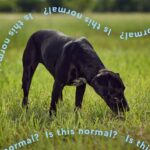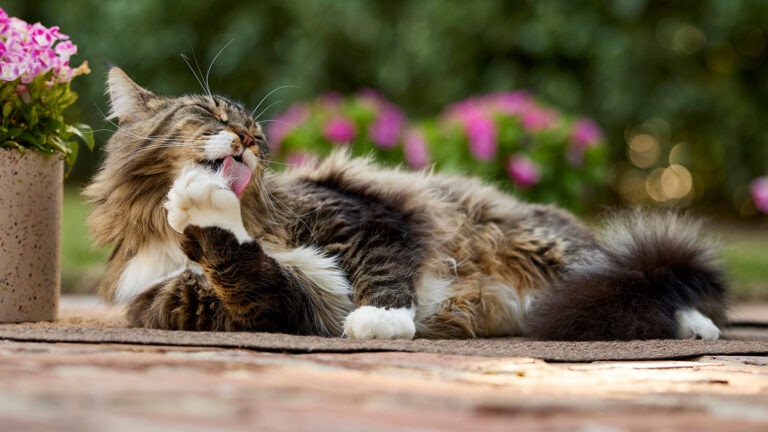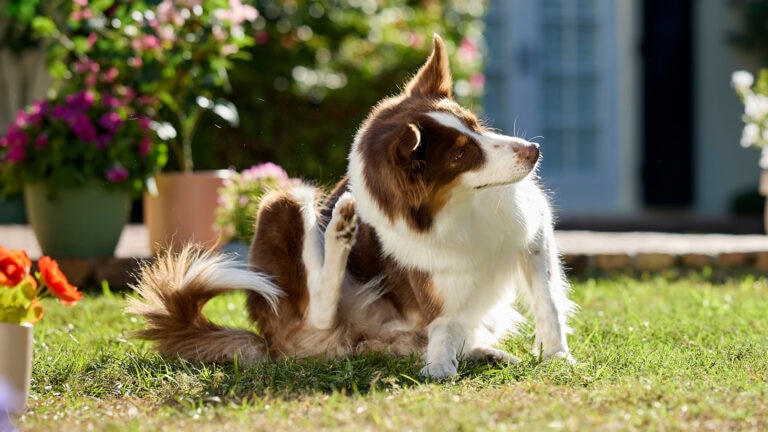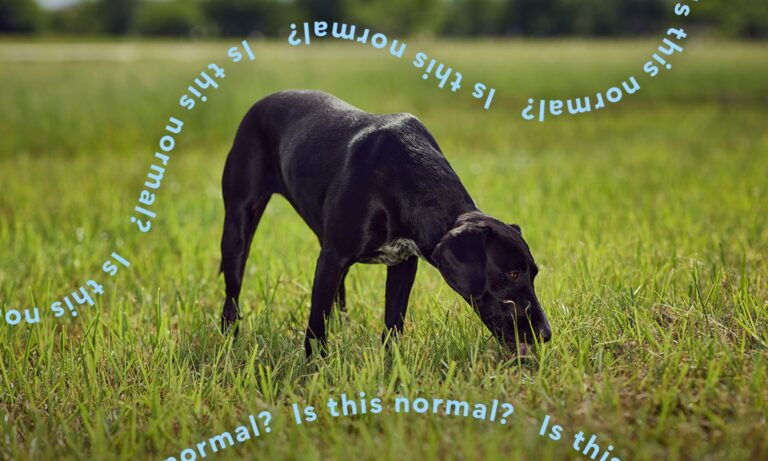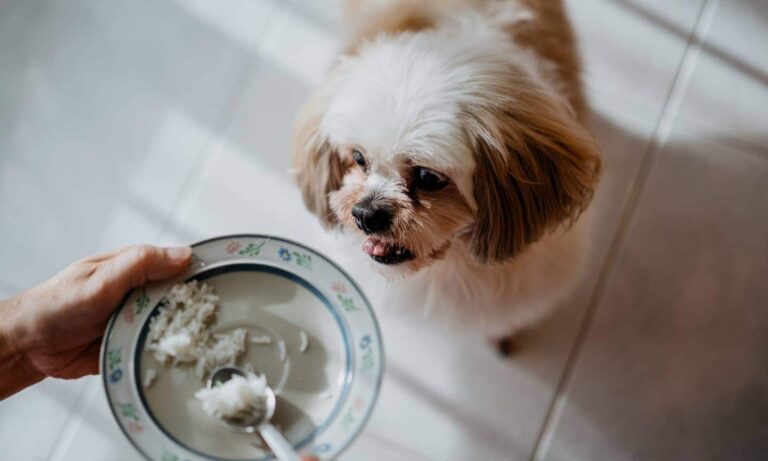Are Poinsettias Poisonous to Cats and Dogs?
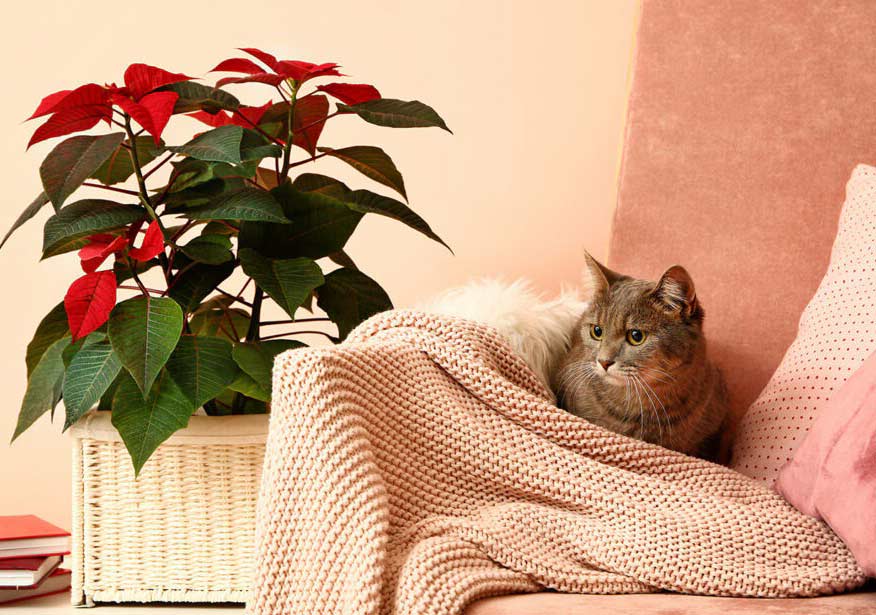
Photo by Pixel-Shot/Adobe Stock
With its festive red or white flowers, poinsettia (Euphorbia pulcherrima) is one of the most common holiday winter plants. But are poinsettias poisonous to cats and dogs? And if your pet eats the toxic plant, what should you do?
Are Poinsettias Poisonous to Cats?
Poinsettias are on the ASPCA® list of toxic plants and are considered poisonous to cats. But according to the Pet Poison Helpline®, these plants are considered only mildly toxic to cats and dogs.
The common signs of poinsettia poisoning in cats include:
- Licking lips
- Drooling
- Vomiting
- Diarrhea (although rare)
- Skin irritation—including redness, swelling, and itchiness—at the site of exposure
- Mild eye irritation
If you notice any signs of poinsettia poisoning in your pet, immediately call your veterinarian or the Pet Poison Helpline at 855-764-7661.
Are Poinsettias Poisonous to Dogs?
Poinsettias are poisonous to dogs too; and the signs of poinsettia poisoning in dogs are the same as those in cats (irritation, vomiting, drooling, and diarrhea).
Unless the clinical signs are severe, medical treatment is rarely necessary. However, do call your vet or the Pet Poison Helpline as soon as possible if your pet does eat any toxic plant.
Why Poinsettias Are Toxic For Dogs and Cats
Poinsettia plants contain a milky white sap that make it toxic to pets. However, the danger is “very overrated,” says Carol Osborne, DVM, of the Chagrin Falls Pet Clinic in Chagrin Falls, Ohio.
“Around Christmastime, we see all these warnings on the internet about poinsettias,” Dr. Osborne says. “The truth of the matter is, most plants might make the animal drool or get a tummy ache or get a little diarrhea, but most plants are not fatal,” Dr. Osborne says.
But that’s no reason to be lax about holiday safety.
“There are some plants that absolutely can be a matter of life and death,” she adds. “Mistletoe berries are super toxic—they can cause a heart attack and even death.”
Knowing which popular Christmas plants are toxic to dogs and cats is the key to keeping your pet safe.
Other Holiday Plants Dangerous to Pets
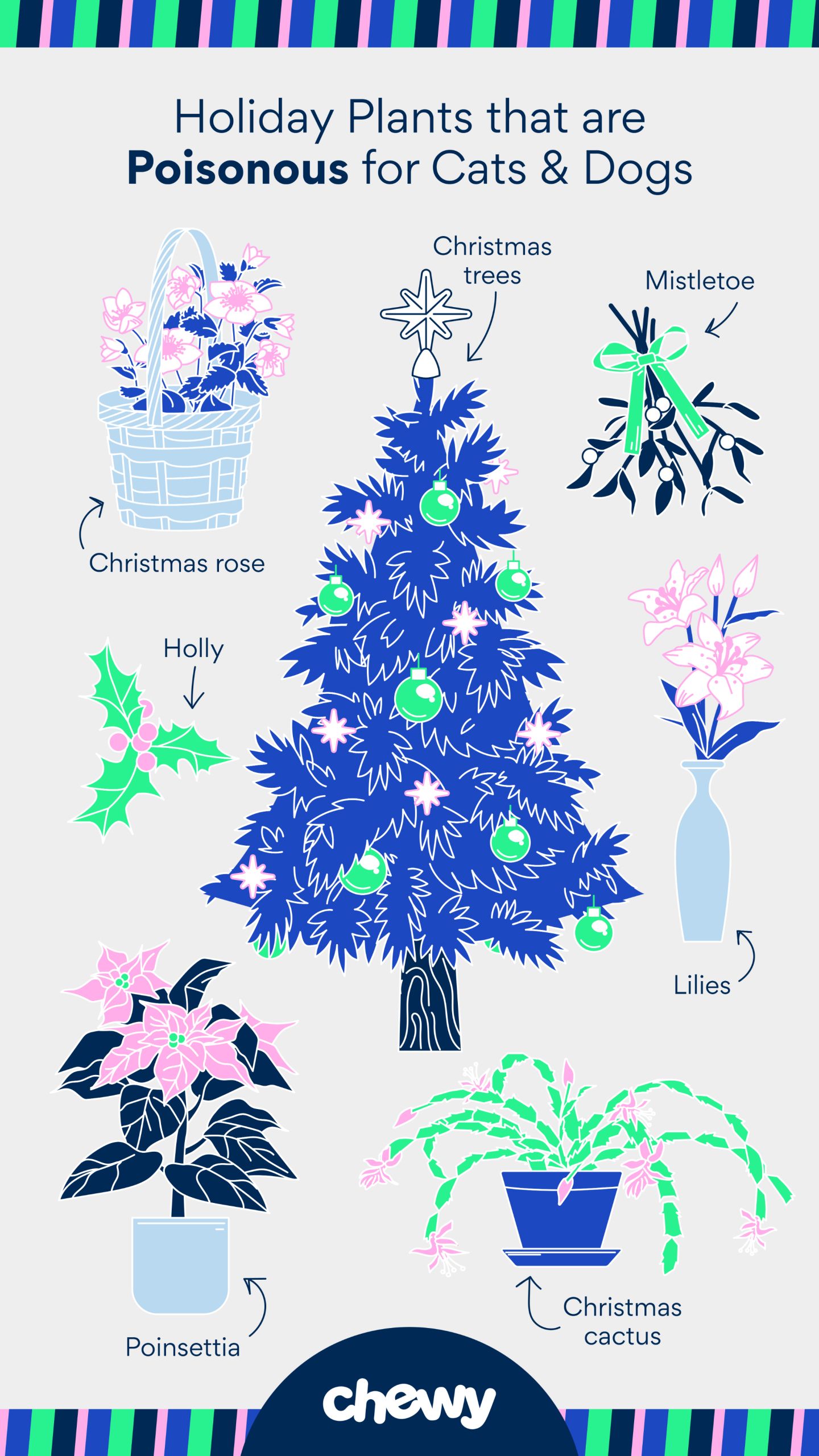
Photo by Chewy
Here some common holiday plants that are poisonous to pets, according to Dr. Osborne and Tina Wismer, DVM, DABVT, DABT, medical director at the ASPCA Animal Poison Control Center.
- Christmas cactus: Although the Christmas cactus (Schlumbergera bridgesii) is technically not toxic if ingested, it is not entirely risk-free. When eaten, both cats and dogs can have reactions to the plant, including mild vomiting, nausea, and diarrhea. “In cats, ataxia (abnormal, uncoordinated movements) has been reported,” says Dr. Wismer. If you choose to display this plant during the holidays, discourage pets from chewing on it.
- Christmas rose: The Christmas rose (Helleborus niger) is deadly, Dr. Wismer says. It contains toxic cardiac glycosides, saponins, and protoanemonin, which cause drooling, vomiting, diarrhea, abdominal pain, and lethargy in both cats and dogs.
- Christmas trees: Live Christmas trees are not necessarily toxic to dogs and cats, but pets might experience gastrointestinal upset (nausea, vomiting, and diarrhea) or skin irritation if they ingest or come into contact with tree sap or pine needles, says Dr. Osborne.
- Holly: Certain types of holly contain toxic saponins, and the spiky leaves also wreak havoc on pets who decide to chomp down on them. Although ingesting holly is not generally fatal to dogs and cats, Dr. Wismer says, it causes extreme discomfort. Signs of holly ingestion include lip smacking, drooling, head shaking, vomiting, diarrhea, and lethargy.
- Lilies: All parts of the lily plant are poisonous, so live or cut lilies should not be kept in homes with pets, Dr. Wismer says. Signs of exposure to lilies include vomiting, diarrhea, lethargy, lack of appetite, and increased or decreased urination. Seek urgent veterinary care if you think your pet ingested even a tiny bit of a lily, touched the pollen, or drank water from a vase of lilies—especially for cats. Cats are very sensitive to kidney issues caused by ingesting toxins from lilies.
- Mistletoe: Several species of mistletoe (Phoradendron flavescens) are toxic to dogs and cats. Ingesting small amounts of mistletoe can cause gastrointestinal upset (drooling, vomiting, diarrhea, and abdominal pain), Dr. Wismer says. And when eaten in larger quantities, it can cause low blood pressure, difficulty breathing, seizures, and even death in pets. Opt for plastic or silk mistletoe instead.
What To Do If Your Pet Eats a Toxic Plant
If you believe that your pet may have nibbled on a poisonous holiday plant (or if your pet is acting sick and you don’t know why), seek immediate veterinarian attention. Take photos of the plant in question or bring a sample with you to the vet, Dr. Osborne says.
“If you think your pet ingested a toxic plant, don’t wait!” says Gary Weitzman, DVM, president and CEO of the San Diego Humane Society. “Plan on visiting your veterinarian or an emergency clinic right away. Call first because your vet might ask you to induce vomiting in your pet.”
Inducing vomiting should only be done for dogs and only under direction from your veterinarian or a veterinarian at an animal poison control center, Dr. Weitzman adds. Inducing vomiting is not a good idea in some instances, so always seek veterinary guidance before attempting to do this.
If your pet ingests a toxic plant after-hours when your veterinary clinic is closed or if you’re very far from an emergency veterinary hospital, you can call an animal poison control center.
Two animal poison hotlines are available 24 hours a day, seven days a week:
- Pet Poison Helpline: 855-764-7661 ($85 consultation fee applies)
- ASPCA Animal Poison Control Center: 888-426-4435 (consultation fee applies; $95 at the time of publication)
Another option is Chewy’s Connect with a Vet, which provides telehealth for dogs and cats. The live chat is free for Chewy customers, and the team of licensed veterinarians can even transfer pet parents to the Pet Poison Helpline for a discounted rate.
This content was medically reviewed by Chewy vets.


